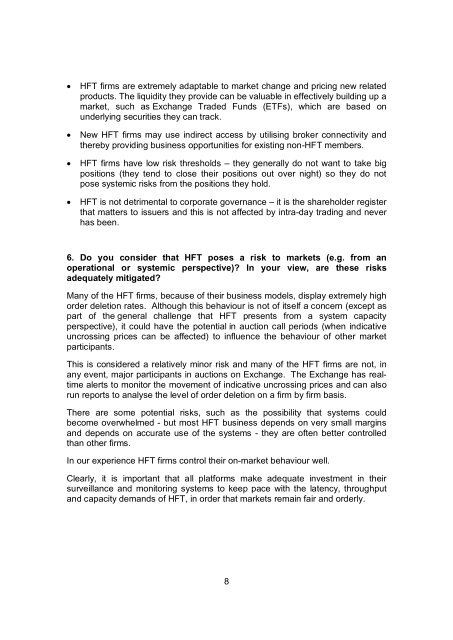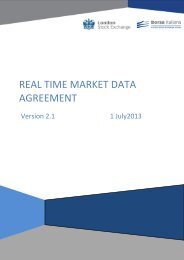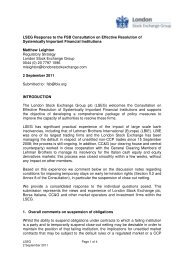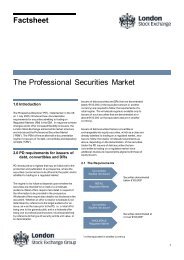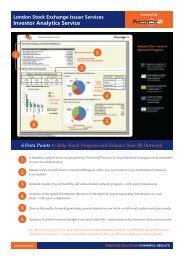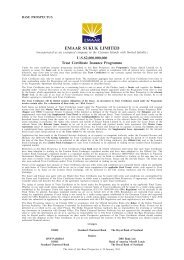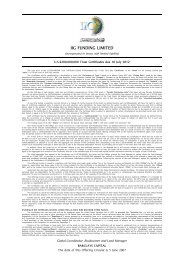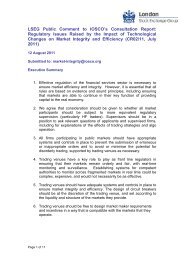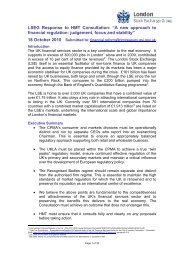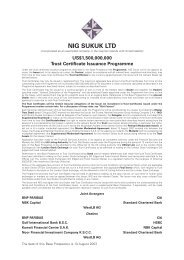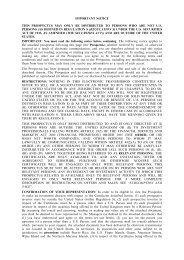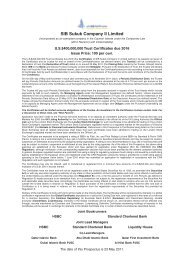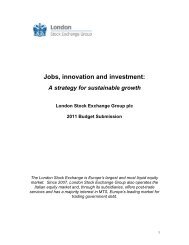I. High frequency trading (HFT) - London Stock Exchange
I. High frequency trading (HFT) - London Stock Exchange
I. High frequency trading (HFT) - London Stock Exchange
You also want an ePaper? Increase the reach of your titles
YUMPU automatically turns print PDFs into web optimized ePapers that Google loves.
<strong>HFT</strong> firms are extremely adaptable to market change and pricing new related<br />
products. The liquidity they provide can be valuable in effectively building up a<br />
market, such as <strong>Exchange</strong> Traded Funds (ETFs), which are based on<br />
underlying securities they can track.<br />
New <strong>HFT</strong> firms may use indirect access by utilising broker connectivity and<br />
thereby providing business opportunities for existing non-<strong>HFT</strong> members.<br />
<strong>HFT</strong> firms have low risk thresholds – they generally do not want to take big<br />
positions (they tend to close their positions out over night) so they do not<br />
pose systemic risks from the positions they hold.<br />
<strong>HFT</strong> is not detrimental to corporate governance – it is the shareholder register<br />
that matters to issuers and this is not affected by intra-day <strong>trading</strong> and never<br />
has been.<br />
6. Do you consider that <strong>HFT</strong> poses a risk to markets (e.g. from an<br />
operational or systemic perspective) In your view, are these risks<br />
adequately mitigated<br />
Many of the <strong>HFT</strong> firms, because of their business models, display extremely high<br />
order deletion rates. Although this behaviour is not of itself a concern (except as<br />
part of the general challenge that <strong>HFT</strong> presents from a system capacity<br />
perspective), it could have the potential in auction call periods (when indicative<br />
uncrossing prices can be affected) to influence the behaviour of other market<br />
participants.<br />
This is considered a relatively minor risk and many of the <strong>HFT</strong> firms are not, in<br />
any event, major participants in auctions on <strong>Exchange</strong>. The <strong>Exchange</strong> has realtime<br />
alerts to monitor the movement of indicative uncrossing prices and can also<br />
run reports to analyse the level of order deletion on a firm by firm basis.<br />
There are some potential risks, such as the possibility that systems could<br />
become overwhelmed - but most <strong>HFT</strong> business depends on very small margins<br />
and depends on accurate use of the systems - they are often better controlled<br />
than other firms.<br />
In our experience <strong>HFT</strong> firms control their on-market behaviour well.<br />
Clearly, it is important that all platforms make adequate investment in their<br />
surveillance and monitoring systems to keep pace with the latency, throughput<br />
and capacity demands of <strong>HFT</strong>, in order that markets remain fair and orderly.<br />
8


